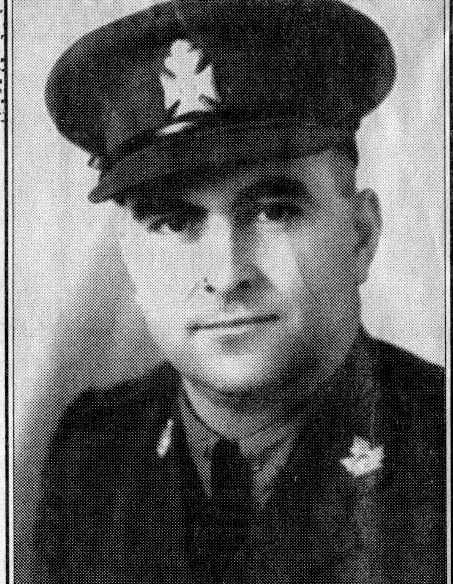
Fred Payton – Prince Albert Historical Society
Most people from the Prince Albert area will be familiar with the name Ted Matheson. He opened a men’s wear store in 1929 which continues in operation today, managed by his grandson. Not as familiar to local residents will be the name Foster Matheson, who was Ted’s younger brother. And yet, this Prince Albert native made a decision which esteemed World War II historian Terry Copps praises as one of the best tactical decisions of World War II’s Normandy campaign.
Born in 1905 and educated locally, Matheson had joined the Prince Albert Volunteers in October 1923. This decision was prompted primarily by a sense of patriotic duty, but for Matheson there was also a side benefit. Those who signed up for the Volunteers earned the right to play on a local football field, an activity which was of obvious interest to Foster. A young man with high school matriculation, and employed in a white-collar job as an accountant, Matheson was immediately commissioned as a lieutenant in the Volunteers. He was later promoted to captain, became a major in 1934, and by 1935 was a company commander.
Matheson became a full-time active soldier on June 1st, 1940, as a member of the 1st Battalion of the Regina Rifle Regiment. Within days of signing on, he had recruited 300 other men from Prince Albert.
Initially, this group trained at the base in Dundurn before moving to Truro, Nova Scotia, from where they were transported to England before embarking on the Normandy invasion on June 4th, 1944. By this time, Matheson had risen to the rank of Lieutenant Colonel.
Three days later, on June 7th, Matheson began his day at 3:00 a.m. in a meeting at the headquarters of the 7th Brigade. He was ordered to move his troops forward to seize the high ground on the Caen-Bayeux road at Bretteville where his battalion was the first Allied troop to meet their D-Day objective. Later that day, with his confidence growing, Matheson countermanded an order to pull back. As a result, it meant that the German tanks were unable to traverse the Caen-Bayeux road with impunity. It was this decision which Copps later praised. Even though over the next three days the Germans mounted an intense infantry and tank assault, they eventually had to withdraw their tanks on June 9th. Matheson and the Regina Refiles had held their position.
Shortly thereafter, Matheson was visited by General Bernard Montgomery, commander of the Allied forces in Normandy. Montgomery advised him at that time that he would be awarded the Distinguished Service Order for his actions in battle. When he received the citation, it read:
“The Regina Rifle Regiment carried out the initial assault on 6 June 1944. They reached the brigade objective on 7 June 1944 and from that time onwards until 11 June have fought off many counter-attacks. The fighting spirit, tenacity and high morale of this unit can be ascribed to the cool-headed and inspiring leadership of Lieutenant-Colonel Matheson.
On particular on the night of 8/9 June 1944, when the Battalion Headquarters was attacked by PZ KW Mk V tanks and infantry, the colonel himself led the defence resulting in knocking out five tanks.”
Matheson continued this inspiring leadership of the battalion until returning to England on November 13th, where after a brief period of leave he assumed responsibility for training at Aldershot barracks.
After 2,088 days in the army, he left in December 1945 as a full colonel, returning to civilian life as the assistant manager of a Prince Albert creamery. Matheson later moved to Saskatoon, where he worked as an investment banker, and served as commandant of the Corps of Commissionaires for northern Saskatchewan, as well as on that community’s City Council, and later manager of their Chamber of Commerce. He died of a heart attack in 1967.
This is but one of many stories which can be found in the Historical Museum and Bill Smiley Archives about the brave men and women from Prince Albert and area who have served their country in uniform. We invite you to join us to share these stories, as well as to add to them. If you have photographs we can copy, mementoes you wish to donate, or simply anecdotes to share, we would be delighted to speak with you. We are open most days Monday through Friday from 9:00 a.m. to 4:00 p.m. On Remembrance Day, in order to allow us the opportunity to participate in the Commemoration to be held in Memorial Square, we will be open from 1:00 p.m. to 4:00 p.m. Come and join us as we honour our veterans and all who have made sacrifices in an effort to allow so many people the chance to live lives of freedom.

